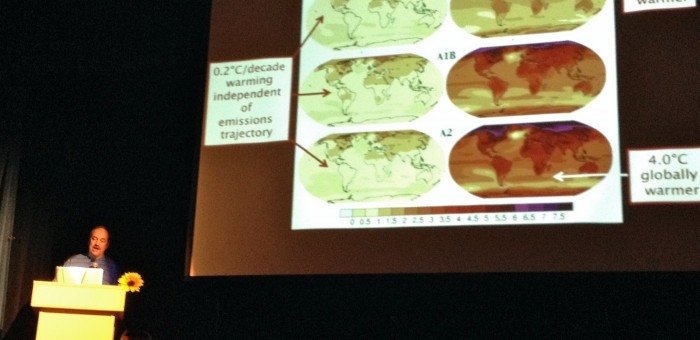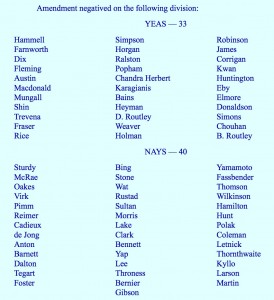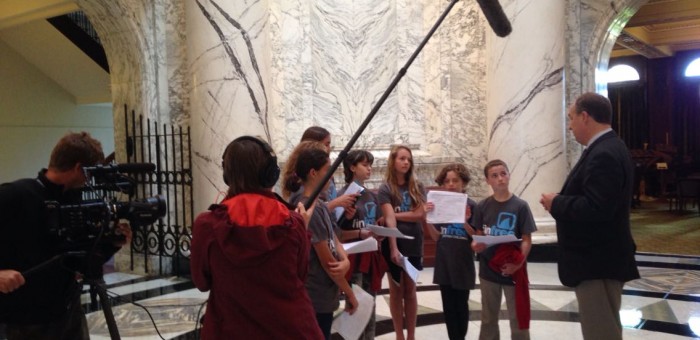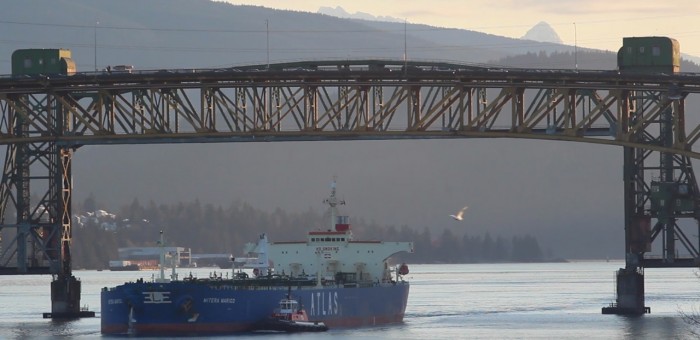Environment
The passing of Bill 2 – an end of an era
After nine days of debate, Bill 2 – The Greenhouse Gas Industrial Reporting and Control Act, finally passed committee stage and the Bill will receive Royal Assent shortly. As I mentioned earlier, Bill 2 will lock us into a path of increasing greenhouse gas emissions, while foregoing the development of a truly diversified and sustainable 21st century economy.
During second reading I spoke passionately against the bill, arguing that it represents a betrayal of future generations. I highlighted the fact that the bill replaced British Columbia’s continent leading greenhouse gas reduction policies with a made-in-Alberta, Harper government approach to reducing greenhouse gas emissions intensity.
During the days of debate I moved a hoist amendment that called for the bill to be delayed by 6 months to give MLAs and the public more time to scrutinize it. The amendment was defeated.
During committee stage I asked numerous questions to explore the consequences of implementing Bill 2. I probed the government’s rationale for dismantling its previous climate policies. And I proposed several amendments to the Bill to improve its clarity but all were defeated.
In one final attempt to provide clarity to British Columbians about what the bill was really doing, I moved an amendment to change the title from:
Greenhouse gas industrial reporting and control act
to
Greenhouse gas increase and industrial reporting act
As you will see from Hansard (reproduced below), the rationale for introducing this amendment was to make it clear what the bill will actually do. The title of the bill suggests that there is going to be a control on industrial emissions. This is not the case. The control is only going to be on industrial emissions intensity. That is, instead of reducing carbon pollution, the bill just allows industrial emitters to pollute more efficiently. I was hoping to make the bill transparent in that it was providing for an increase in greenhouse gas emissions.
A. Weaver: At this stage I’d like to move an amendment:
[TITLE, by deleting the text shown as struck out and adding the text shown as underlined:
BILL 2 – 2014
GREENHOUSE GAS INCREASE AND INDUSTRIAL REPORTING AND CONTROL ACT]
We had in this debate, at third reading, a number of amendments put forward to try to improve the legislation. They’ve all been defeated. We’ve just had the most recent amendment put forward by the member for Vancouver–West End — a nice amendment that was designed specifically to make this the cleanest LNG in the world.
In framing a title, it’s very, very critical that the title actually reflect the legislation that it is actually representing. What we have here is a title that says Greenhouse Gas Industrial Reporting and Control Act. The reality is there is no control in the greenhouse gas emissions associated with this act, so the amendment that I put forward is to change the title to the greenhouse gas increase and industrial reporting act, as I submitted and put on notice a couple of days ago.
The Vote
Pushing for a Ban on Sale, Trade and Distribution of Shark Fins in BC
Media Statement: November 20, 2014
Pushing for a Ban on Sale, Trade and Distribution of Shark Fins in British Columbia.
For immediate release
Victoria, B.C. – Today in question period the Minister of Agriculture committed to meeting with Andrew Weaver, MLA for Oak Bay-Gordon Head and Deputy Leader of the B.C. Green Party, to discuss how the province of British Columbian could end the sale, trade and distribution of shark fins in British Columbia.
Shark finning typically involves cutting off a shark’s fins and throwing their still-live bodies back into the water. Finned sharks then suffer a slow, grueling death through starvation, drowning or gradual predation.
“Scientific research clearly demonstrates that shark finning is a major reason for the declining shark populations worldwide” says Andrew Weaver. “Many of these iconic species are now at risk of extinction.”
In 2012 CTV News reported that 76 percent of DNA-tested dried shark fins purchased in Vancouver fell on the threatened or endangered red list published by the United Nations International Union for Conservation of Nature. Those samples also indicated the presence of great hammerhead and porbeagle fins, both of which are now classified as endangered species by the UN Convention on International Trade, to which Canada is a party.
“This issue was brought to me by a group of young, engaged students who are deeply concerned about what’s going on,” said Weaver. “We now have an opportunity for the provincial government to take leadership and demonstrate to these of children that they are responsive to their concerns.”
Twelve municipalities in B.C. have banned shark fins in their jurisdictions while all restaurants in Victoria have taken shark fin soup off their menus. Many other restaurants throughout the province have taken similar steps, yet shark fins continue to be bought and sold around the province.
In conjunction with his question, Dr. Weaver tabled a legal opinion that states that British Columbia has the authority to ban the sale, trade and distribution of shark fins through constitutional provisions.
“This issue is often perceived to be something that only the federal government can act on in a serious way” said Andrew Weaver. “However, I received legal advice that there are concrete steps that can be taken by this government to end this practice. I am pleased to see the government shares my concerns and has agreed to meet to discuss how we can go about ending this practice.”
-30-
Media Contact
Mat Wright – Press Secretary, Andrew Weaver MLA
Mat.Wright@leg.bc.ca
Cell: 1 250 216 3382
Banning the sale, trade and distribution of shark fins in British Columbia
Yesterday in Member’s Statements I spoke about a remarkable group of students from Glenlyon-Norfolk School who are raising awareness about the plight of the world’s sharks. Today in the legislature I was up in Question Period. I took the opportunity to first ask the government if they would be willing to introduce legislation to ban the sale, trade and distribution of shark fins in British Columbia. I followed up to see if they would be willing to work with me and other MLAs to develop a strategy that would eventually lead to banning the sale, trade and distribution of shark fins in British Columbia. I received a very positive response and hope to work with MLAs from all parties to see if we can move this issue forward.
MY QUESTION
Honourable Speaker, last year Boris Worm, an internationally-renown marine conservation biologist published a paper in the Elsevier journal Marine Policy entitled “Global catches, exploitation rates and rebuilding options for sharks.” In it, he and his colleagues produced three independent estimates of the average rate that sharks are killed per year. These estimates ranged between 6.4% and 7.9%, all exceeding 4.9% per year, the amount needed to keep populations stable.
Shark finning is one of the leading causes of the decline in global shark populations, honourable speaker. Finning involves cutting off a shark’s fins and throwing their still live body back into the sea. Finned sharks suffer a slow, grueling death through starvation, drowning or gradual predation.
Madame speaker, there are already twelve municipalities in British Columbia that have shark fin bans in place. All restaurants in Victoria have taken shark fin soup off their menus. Many have done the same in Vancouver. But there is still a long way to go to protect these iconic creatures from becoming committed to extinction.
Will the government introduce legislation to ban the sale, trade and distribution of shark fins in British Columbia?
MINISTER LETNICK’S RESPONSE
We understand the member opposite’s question — and thank you for the question. Obviously, there’s a lot of public concern with the harvesting and finning of sharks, and we are interested in looking at the issue.
We understand that the federal government has had a ban since 1994 on the practice of finning in domestic waters. It is controlled by CFIA, as far as the importation of fins into our province, into our country. The DFO, of course, controls the harvesting in our waters. It is federal jurisdiction. But I do want to say to the member opposite that I understand the question, and I understand the concerns.
MY SUPPLEMENTAL QUESTION
Madame speaker, in late 2012 CTV News reported that 76 percent of DNA tested dried shark fins purchased in Vancouver fell on the threatened or endangered red list from the United Nations International Union for the Conservation of Nature. In fact, honourable speaker, samples also indicated the presence of Great Hammerhead and Porbeagle fins, both of which are contained in Appendix I on the United Nations Convention on International Trade in Endangered Species of Wild Fauna and Flora to which Canada is a party.
Madame Speaker, section 92(13) of the Constitution Act, 1867 grants powers to British Columbia to legislate under “Property and Civil Rights in the Province”. Section 92(16) grants powers to legislate under “Generally all Matters of a merely local or private Nature in the Province.”
Honourable speaker, I am in possession of a legal opinion that states that: “British Columbia has the authority to ban the sale, trade and distribution of shark fins” through constitutional provisions pursuant to section 92(13) and section 92(16) of our constitution.
My question is this. Will the government commit to working with me and other MLAs to develop a strategy that would eventually lead to banning the sale, trade and distribution of shark fins in British Columbia?
MINISTER LETNICK’S RESPONSE
Madame Speaker, I thank you, as well, for allowing me to answer the question.
As I said before, to the best of my understanding it is federal jurisdiction. However, I look forward to seeing the documents that the hon. member will table after question period, and I’d be happy to meet with him next week to discuss the matter further.
Celebrating Glenlyon-Norfolk School and Fin Free Victoria
Honourable Speaker, today I’d like to speak to you about the importance of the youth voice in our society.
 And I’d like to illustrate this by focusing specifically on the efforts of a remarkable group of students from Glenlyon-Norfolk School who are being featured in an upcoming documentary entitled Child of Nature, produced by Enigma Films under contract from Warner Brothers.
And I’d like to illustrate this by focusing specifically on the efforts of a remarkable group of students from Glenlyon-Norfolk School who are being featured in an upcoming documentary entitled Child of Nature, produced by Enigma Films under contract from Warner Brothers.
Madame Speaker, sharks have been present in our oceans for over 400 million years. They have survived the Earth’s five great extinction events including times when up to 80% of all marine species were wiped out. But they are struggling now in the anthropocene, the 6th great extinction event, because of a cruel and wasteful process known as shark finning.
In February 2012, Rob Stewart, Director of the film Sharkwater gave a powerful presentation to Glenlyon-Norfolk School. He inspired and motivated the students in the room. They became determined to do what they could to make people aware of the plight of the world’s shark population.
 Together with their teacher, Mrs. Margaret McCullough, these students set up a not for profit known as Fin Free Victoria.
Together with their teacher, Mrs. Margaret McCullough, these students set up a not for profit known as Fin Free Victoria.
Madame speaker, this incredibly passionate and articulate group of young students has worked tirelessly for several years.
They’ve visited numerous municipalities and businesses in Victoria, Vancouver, Richmond and elsewhere on Vancouver Island. They’ve given presentations to restaurant groups; they’ve collected signatures on petitions; they’ve conducted media interviews; they’ve participated in press conferences; they’ve met with many municipal councillors as well as provincial and federal politicians.
And at all times, they’ve done so with deepest respect for, and sensitivity of, British Columbia’s diversified cultural heritage.
Madame Speaker, this group of young students, has been so effective that shark fin soup has disappeared from the menus of all Victoria restaurants. Fin-Free stickers are proudly displayed instead. The same is true for a growing number of establishments in Richmond and Vancouver, thanks in part to the collaborative efforts of Fin Free Victoria.
Honourable speaker, it gives me hope and inspiration to see the youth of today so engaged in such important societal issues.
While we in this room ultimately represent the decision-making generation, it is their generation that will have to live the consequences of our decisions.
Each and every one of us should reflect upon that from time to time.
Confidence Lost in NEB Assessment Process for Trans Mountain Pipeline
At some point it’s time to say enough is enough.
For months now we’ve seen mounting evidence that the National Energy Board (NEB) hearings on the Trans Mountain pipeline are seriously flawed. Cross-examination has been declined, deadlines for submission of information are short, intervenors can’t get their questions answered, relevant concerns are being ignored, and attempts to fix the process are shut down by the very organization that is tasked with protecting our interests: the NEB.
Last week, Trans Mountain sued Burnaby residents for “trespassing” on public parkland and sought an injunction against obstruction to the work they were mandated to conduct. In essence, they were asking the courts to intervene in the democratic right of Burnaby residents to protest against a project that neither had their support, not that of the City of Burnaby.
At the same time, one of the most credible intervenors, Marc Eliesen, quit the hearing process. With over 40 years of experience in the energy sector, Eliesen is a former board member of Suncor Energy, CEO of B.C. Hydro, Chair of Manitoba Hydro and deputy minister in several federal and provincial governments. He issued a scathing letter to the National Energy Board outlining the reasons for his exit and specifically cited concerns that the NEB was failing to fulfill its role as an impartial, transparent review body.
Back in 2010 when the BC Provincial Government and the Federal Government signed the “Environmental Assessment Equivalency Agreement” the province chose to streamline the assessment process by unifying what had previously been two separate provincial and federal environmental reviews.
This could have worked well if the interests of British Columbians were properly taken into account during the Energy Board hearings. Unfortunately what we have seen is a federally-run process that is ignoring our concerns. It is imperative that we remedy this now, before it’s too late.
Enough is enough. Our provincial government must reclaim British Columbia’s right to have our own, made-in-BC, hearing process. They can and should do so by immediately issuing the 30 day notice, required to cancel its equivalency agreement for this project with the Federal government. British Columbia could then launch its own, separate, environmental assessment. It’s time for the government to step up and protect our interests for it’s clear that the National Energy Board is not doing so.








